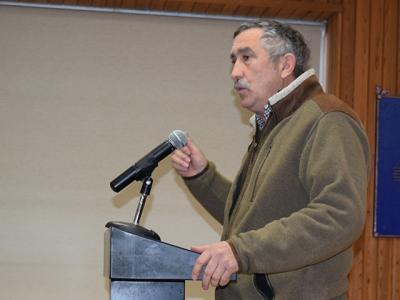‘Nobody Asked Us,’ Some in Montauk Say

Residents of Montauk delivered a catalog of complaints to the East Hampton Town Board at its work session at the hamlet’s firehouse on Tuesday, with year-round residents fuming that they were in the dark with respect to a hamlet study they fear is rushing toward implementation without the benefit of their input.
But the board, and some residents, pushed back, noting that the hamlet studies began nearly three years ago, have been amply publicized in the media and on the town government’s website, and that some of those in attendance had even participated in discussions of the Montauk study. Further, board members emphatically stated that no components of the study, which they described as a vision statement, have yet been adopted.
Several residents told the board that they became aware of the hamlet study only recently and that they vehemently disagree with many of the recommendations issued by the consultants engaged to conduct it. A sewage treatment plant is unnecessary, some said, and a planned relocation of oceanfront businesses would be astronomically expensive. Proposed roundabouts were also criticized, though some agreed that the intersection of West Lake Drive and Flamingo Avenue, entering the dock area, would benefit from one.
A public hearing on the Montauk hamlet study was held on Dec. 6 at Town Hall in East Hampton. Reading from a letter that appears in today’s issue of The Star, Lisa Grenci asked that another public hearing be held in Montauk, in May, June, or September, “when the majority of our residents are available,” and not during the holiday season.
It is apparent, Ms. Grenci said, “that the consultants as well as the board members do not live in Montauk and do not understand what the 898 families or 3,326 year-round residents who live here want or need.” The hamlet study, she said, could more accurately be called “How to Increase Development and Destroy Montauk.”
Given sea level rise, a retreat from the ocean shoreline will be necessary, Ms. Grenci agreed, “But the reconfiguration of our existing hamlet is not acceptable. We all love what we have and if Mother Nature works her hand, so be it.”
Bonnie Brady similarly complained that meetings, walking tours, and other essions were held during the summer, when owners and employees of Montauk’s service industries are too busy to participate. Reading from a letter to the board, she said there had been no attempt to meet with Montauk’s senior citizen community, which she said represents some 30 percent of our year-round community, or with parents of school-age children, or members of the fire department, “a group that represents so many of the tradesmen and business owners of Montauk,” whose opinions should have been solicited.
“There are far too many changes being heralded without input from the year-round residents,” Ms. Brady said, “those that will be the most affected by those changes. Montauk’s year-round community deserves better communication and cooperation from the town board.”
Jim Grimes, a Montauk business owner and a town trustee, said that “the community as a whole sits somewhat ignorant of what’s going on. It takes a moment like this to drag everyone to the table to see all the deficiencies in a project.”
But he disagreed with the recommendation for a planned retreat from the shoreline. “Wholesale relocation of our Main Street and retreat sounds good if we were in Connecticut,” he said. “We’re at the tip of Long Island. . . . Sea level rise has been going on for roughly 20,000 years here. It will continue until the next ice age, when it will be reversed. . . . Before we’re rushing to move hotels out of the downtown area, we should be dealing with things more immediate to our needs.”
But Jessica James had a different view. “There are plenty of people who think the hamlet study is a great thing — I’m one of them,” she told the board. “The process is excellent, I’ve been engaged for three years. I don’t know where everyone else was. . . . Everybody should get engaged.”
The board sought to reassure the residents, but seemed incredulous that they could have been unaware of the hamlet study. Comments were accepted for 30 days after the Dec. 6 hearing, Supervisor Peter Van Scoyoc said, and the board would review those comments “to help inform us as to what to leave in, what to take out.” There will be multiple opportunities, he said, for continued public engagement in the details of the study’s recommendations. After the meeting, the supervisor said that the board would consider all comments received, “whether within the public record or not.”
“We want Montauk to look like Montauk, not Amagansett, because it is different,” said Councilwoman Sylvia Overby. “We’ll all have an opportunity to continue this process. This is not stopping now.”
Implementing changes in the hamlet would require changes in the zoning code, said Councilman Jeff Bragman, which would require environmental review and further public input.
The study, Mr. Van Scoyoc said, is “not a commitment to implement anything, more to be conscious of and consider when we talk about any development.”
While addressing the board, Laraine Creegan, executive director of the Montauk Chamber of Commerce, directed a comment to her fellow residents. “We need to get involved.”
